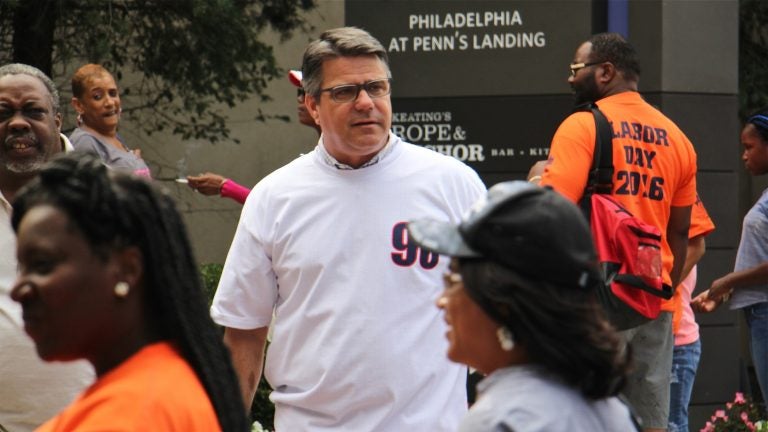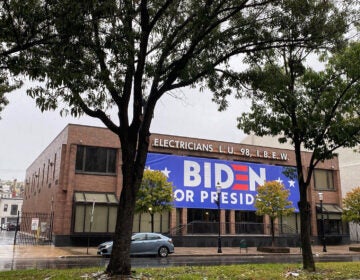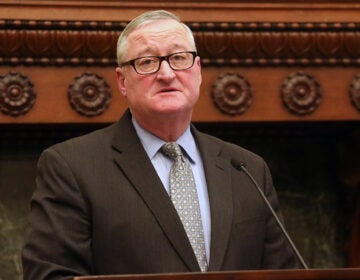Joining the Philly club: Henon to run while indicted
Philadelphia City Councilman Bobby Henon, indicted with powerful union leader John Dougherty, will seek re-election despite facing criminal charges.

Philadelphia City Councilman Bobby Henon wears a Local 98 T-shirt at the Labor Day parade. Henon's office at City Council was searched by the FBI a month before. (Emma Lee/WHYY)
Philadelphia City Councilman Bobby Henon is running for re-election this year, even after he was indicted last week along with International Brotherhood of Electrical Workers Union Local 98 chief John Dougherty.
Henon will ask for voters to support him as he faces charges of conspiracy, honest services fraud, and federal program bribery.
“I stand on my record for the people of the 6th District and I’m sure we will continue to do so as we continue to go towards re-election,” Henon said right before Council started its weekly session Thursday. And though rumors had circulated that he would step down or be removed as majority leader, he denied that. “”I have done nothing wrong, and continue to serve this caucus as majority leader.”
Does he have a chance?
Yes.
As of Wednesday, a week after the charges were announced, no candidate had emerged to challenge him, according to interviews with ward leaders, political consultants and others who follow local political developments.
Two factors account for the lack of opposition: timing and clout.
Timing
It takes time to organize a political campaign, and the charges against Henon arrived well into the primary election season.
The period for circulating nominating petitions begins Feb. 19 and ends March 13.
Consultant Mustafa Rashed said it takes a field organization to collect the necessary 750 signatures and reach out to voters.
“Either you were ready to do that or you weren’t,” Rashed said in an interview. “And, at this late date, I imagine it would be hard to get it up and running at this point.”
Party ward leaders can get their committee people to circulate nominating petitions if they’re committed to a candidate, and some in the district have feuded with Dougherty and Henon in the past.
But they’d need a candidate willing to take on Henon’s powerful backers.
Clout
Dougherty’s union, IBEW Local 98, has the biggest spending political committee in Pennsylvania.
And while Dougherty also faces criminal charges, he’ll remain head of the union and business manager of the Philadelphia Building Trades Council while awaiting trial.
That gives him and Henon access to cash and powerful allies at least through the May 21 primary election.
“They can still use their considerable resources, both financial and manpower resources, to have some influence in elections,” said Democratic strategist Mark Nevins.
Dougherty’s allies in the Building Trades are also major spenders on campaigns, and they’d likely remember anyone who challenges Henon for a long time.
One Democratic source said potential candidates will more likely strategize about what to do after the charges against Henon are resolved.
If he wins re-election and is convicted at trial, he would forfeit the office upon sentencing. A special election would then be called to fill the seat.
History
There’s a history of Philadelphia elected officials seeking re-election while indicted. The evidence suggests voters don’t much like it, but sometimes the gambit works.
In 2016, U.S. Rep. Chaka Fattah and state Rep. Vanessa Lowery Brown were both seeking re-election while facing corruption charges.
Both got a little more than a third of the vote in the Democratic primary. Fattah lost to Dwight Evans, who pulled in 42 percent.
Lowery Brown won because four rivals split the opposition votes. She cruised to victory without opposition in the general election.
Both were later convicted.
When powerful state Sen. Vince Fumo faced a 2008 re-election battle while under indictment, he decided not to run. Unlike the circumstance in Henon’s race, Fumo’s charges came far enough in advance of the election for candidates to plan campaigns against him.
Ironically one of the candidates who ran for the seat was Dougherty, who lost to now-state Sen. Larry Farnese.
One of the more unusual stories of politicians running through trouble was that of North Philadelphia state Rep. Leslie Acosta, who was re-elected in 2016, despite having pleaded guilty to money laundering.
The reason: She made the plea bargain quietly without telling the media or her constituents, who voted in the Democratic primary to return her to Harrisburg. The plea became public during the general election, in which she had no opposition.
She resigned under pressure in January 2017.
Note: An earlier version of this article misstated Leslie Acosta’s name.
WHYY is your source for fact-based, in-depth journalism and information. As a nonprofit organization, we rely on financial support from readers like you. Please give today.





